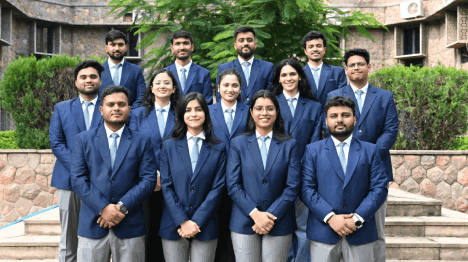- About Us
-
Academics
Schools
Programs
General Information
-
Faculty
The faculty members and researchers working at IIHMR University come from varied backgrounds including, but not limited to medicine, public health, management, economics, statistics, demography, human geography, social and behavioral sciences, rural development and pharmaceuticals.
-
Admissions
- Research
Publications & Journal
- Executive Education
Executive Programmes
- Online Certification Courses
ONLINE CERTIFICATION Courses
- Training
- Placements
- Contact
- Pradanya
- Blog
- Fee Payment
- NAAC
- IQAC
- NIRF
-
About Us
- About IIHMR University
- Board of Management
- Academic Council
- Board of Studies
- Research Board
- Institutional Review Board
- Finance & Audit Committee
- Departmental Research Committee
- Chairperson's Message
- President's Message
- IIHMR University Act
- Infrastructure
- Collaboration
- Ranking
- Board of Studies (School of Digital Health)
- Awards & Accolades
-
Academics
- Institute of Health Management Research
- School of Pharmaceutical Management
- ML Mehta School of Development Studies
- School of Digital Health
- SD Gupta School of Public Health
- MBA (Hospital and Health Management)
- MBA (Pharmaceutical Management)
- MBA (Development Management)
- MBA (Healthcare Analytics)
- Master of Public Health
- Student Manual – Cohort 9 (2021-2023)
- Master of Public Health (Offered by Johns Hopkins Bloomberg School of Public Health, USA in cooperation with IIHMR University, Jaipur, India)
- Ph. D.
- MBA CSR & ESG Management (Executive)
- MBA Sustainable Business Management (Executive)
- Common Information for all the Programs
- Academic Calendar
- Student Handbook 2020-21
- Committees
- Policies
- Annual Exam Calendar
- Library
- Faculty
- Officers of University
- Dean of Institute of Health Management Research
- Dean of School of Pharmaceutical Management
- Dean of School of Development Studies
- Dean of SD Gupta School of Public Health
- Dean of School of Digital Health
- School of Digital Health
- Faculty List A to Z
- Faculty List Designation Wise
- Faculty List School Wise
- Admissions
- Research
- Executive Education
- Training
- Placements
- Alumni
- Events
- Job Openings
- Contact
- Research
Longitudinal Ageing Study in India (LASI) Wave-1, Rajasthan
Agency : IIPS
The Longitudinal Ageing Study in India (LASI) is a national survey of scientific investigation of the health, economic, and social determinants and consequences of population ageing in India. LASI is a nationally representative survey of older adults aged 45+ in all 30 States and 6 Union Territories that will be conducted every 2 years for the period of 25 year. LASI is developed as per the needs of the Indian elderly population but at the same time it is internationally harmonized enabling not only cross-state analyses within India but cross- country analyses.
The main goal of LASI is to collect credible scientific data on burden of disease, mental health, social and economic wellbeing of elderly population in India.
LASI is designed to cover six major subject and policy domains of adult and older population of India namely:
* Demography, Migration and Marital status, and Housing and Environment
* Health: Disease Burden & Risk factors (reported and measured)
* Health Care and Health Care Financing
* Social: Family and Social Network
* Economic: Income, Wealth, Consumption, Expenditure,
* Work and Employment, Retirement and Pension
* Welfare Programs for Elderly
LASI fieldwork for Rajasthan was conducted from September 2016 to July 2017 by IIHMR University and International Institute for Population Sciences, Mumbai as the nodal agency and gathered information from 2240 individuals aged 45+ and their spouses less than 45 years and additional 3 individuals of aged 65+ from 80 secondary sampling unit (SSU) from 12 districts of Rajasthan.



